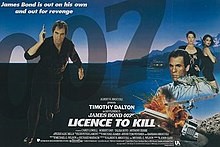Building Legal Solutions
 Welcome to the first in my series of blogs on James Bond films. The first being this 1989 classic starring Timothy Dalton. His third appearance got cancelled due a legal dispute involving the producers – who knew that? On second thoughts I’m no Barry Norman so better to stick to what I know best. That brings us nicely on to the real subject of this post. Why is a Licence sometimes a dangerous instrument?
Welcome to the first in my series of blogs on James Bond films. The first being this 1989 classic starring Timothy Dalton. His third appearance got cancelled due a legal dispute involving the producers – who knew that? On second thoughts I’m no Barry Norman so better to stick to what I know best. That brings us nicely on to the real subject of this post. Why is a Licence sometimes a dangerous instrument?
We are often instructed to draft or advise on lettings of commercial property and it’s crucial to distinguish between a licence and a lease. That requires an understanding of the key characteristics of each and to appreciate some practicalities involved.
Most people will be familiar with a commercial lease that is granted by a landlord and gives the tenant a legal right to exclusive possession of a property for a term and reserving a rent. A standard lease is usually around 40 pages long and creates all sorts of legal right and obligations on the parties. It is also capable of being assigned by the tenant and will bind the landlord’s successors in title.
A licence on the face of it seems much simpler, quicker and cheaper to put in place and will usually be a few pages at most. That makes it appealing for an owner to use but a genuine licence to occupy is a flexible arrangement and can be terminated by either party without much notice and should not give the occupier an exclusive right of possession. The licence is only a contractual right to occupy that would otherwise be trespass. A licence is by definition not a lease: it is a personal right or permission that offers no security or rights to assign.
The third option is a tenancy at will. This is similar to a licence but is normally put in place to give early access whilst the terms of the formal lease are negotiated.
However, just because you label a document as a licence that does not necessarily mean it’s not really a lease! In the event of a dispute the Courts would always look at the substance of the agreement. One of the most famous cases on this subject decided that:
"If the agreement satisfied all the requirements of a tenancy, then the agreement produced a tenancy and the parties cannot alter the effect of the agreement by insisting that they only created a licence."
Given all of that there are lots of circumstances where a licence would be appropriate. Examples include:
- the premises are going to be shared with others and exclusive possession is therefore not practical;
- the owner wants the right to move the occupier to a different part of the building such as serviced offices;
- a concession in a department store;
- when the premises are not enclosed such as car parking spaces or storage areas; or
- it’s only a short term/temporary arrangement
As a tenant you may well prefer a lease that gives exclusive possession and rights to stay known as security of tenure. This is especially the case where the goodwill of your business is intrinsically linked to the location of the property.
A business lease will normally have an automatic right of renewal under the Landlord & Tenant Act 1954 and a right to receive compensation if a landlord successfully opposes the grant of a renewal lease at the end of the term. There is a contracting out procedure where the rights under the 1954 Act are excluded by the landlord serving a notice and the tenant swearing a declaration.
The big problem for a commercial property owner comes when they have signed a licence thinking it has no security of tenure and actually a lease has been granted with renewal rights. At this stage it’s too late and getting back possession is then a long and costly process, which may delay plans for redevelopment or prevent the owner from occupying the property for their own business. It can also cause issues with any refinance of a commercial property as the lender would want to see a formal lease in place to show a reliable income stream for a fixed period.
In most cases therefore it is essential to have a proper lease drafted by a solicitor and the correct procedure followed to exclude security of tenure, if agreed as part of the heads of terms. The lease can always include a break clause (fixed dates or rolling) to give one or both parties the flexibility a licence provides but without the risks.
Each set of circumstances will be different and we advise our clients’ at the earliest opportunity what is the right document whether that be a lease, licence or tenancy at will.
Please contact me to discuss further on 01604 456591 or by email here. In the meantime we can all look forward to the next Bond film being finally released and my review is sure to follow on these pages!
Author: Paul Harrison
5th March 2021

